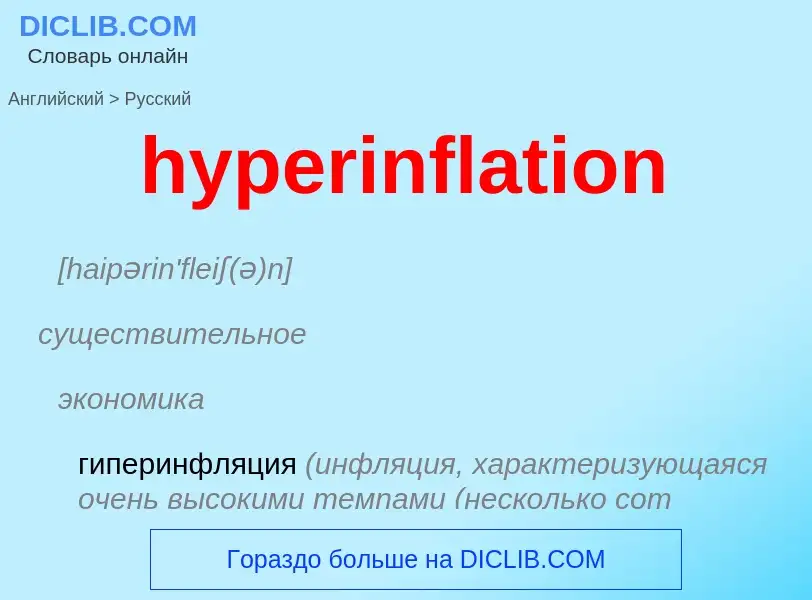Traducción y análisis de palabras por inteligencia artificial
En esta página puede obtener un análisis detallado de una palabra o frase, producido utilizando la mejor tecnología de inteligencia artificial hasta la fecha:
- cómo se usa la palabra
- frecuencia de uso
- se utiliza con más frecuencia en el habla oral o escrita
- opciones de traducción
- ejemplos de uso (varias frases con traducción)
- etimología
hyperinflation - traducción al ruso
[haipərin'fleiʃ(ə)n]
существительное
экономика
гиперинфляция (инфляция, характеризующаяся очень высокими темпами (несколько сот процентов в год))
синоним
Definición
Wikipedia

In economics, hyperinflation is a very high and typically accelerating inflation. It quickly erodes the real value of the local currency, as the prices of all goods increase. This causes people to minimize their holdings in that currency as they usually switch to more stable foreign currencies. When measured in stable foreign currencies, prices typically remain stable.
Unlike low inflation, where the process of rising prices is protracted and not generally noticeable except by studying past market prices, hyperinflation sees a rapid and continuing increase in nominal prices, the nominal cost of goods, and in the supply of currency. Typically, however, the general price level rises even more rapidly than the money supply as people try ridding themselves of the devaluing currency as quickly as possible. As this happens, the real stock of money (i.e., the amount of circulating money divided by the price level) decreases considerably.
Hyperinflation is often associated with some stress to the government budget, such as wars or their aftermath, sociopolitical upheavals, a collapse in aggregate supply or one in export prices, or other crises that make it difficult for the government to collect tax revenue. A sharp decrease in real tax revenue coupled with a strong need to maintain government spending, together with an inability or unwillingness to borrow, can lead a country into hyperinflation.







![Germany, 1923]]: banknotes had lost so much value that they were used as wallpaper. Germany, 1923]]: banknotes had lost so much value that they were used as wallpaper.](https://commons.wikimedia.org/wiki/Special:FilePath/Bundesarchiv Bild 102-00104, Inflation, Tapezieren mit Geldscheinen.jpg?width=200)
![logarithmic]]). logarithmic]]).](https://commons.wikimedia.org/wiki/Special:FilePath/German Hyperinflation.jpg?width=200)



![motifs]] of banana trees on the currency's 10-dollar banknote. motifs]] of banana trees on the currency's 10-dollar banknote.](https://commons.wikimedia.org/wiki/Special:FilePath/Notes issued by the Japanese Government during the occupation of Malaya, North Borneo, Sarawak and Brunei, used in Batu Lintang camp, Sarawak (1942–1945, obverse).jpg?width=200)



 on a logarithmic scale.png?width=200)
![Z$]]100 trillion banknote (Z$10<sup>14</sup>), equal to Z$10<sup>27</sup> (1 [[octillion]]) pre-2006 dollars. Z$]]100 trillion banknote (Z$10<sup>14</sup>), equal to Z$10<sup>27</sup> (1 [[octillion]]) pre-2006 dollars.](https://commons.wikimedia.org/wiki/Special:FilePath/Zimbabwe $100 trillion 2009 Obverse.jpg?width=200)


